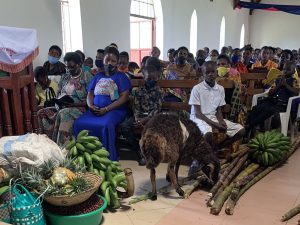Easter in Uganda: focus on fasting
CMS missionaries Andrew and Margie Newman work at Canon Ndimbirwe Bible College in Uganda. They have experienced three Easters in Uganda, two affected by COVID. Nevertheless, they are starting to get a sense of the usual Easter pattern.
Allowing for the fact that two of our three Easters in Uganda have been ‘Corona-ised’, we have so far observed that the season rolls out in a familiar way. There are services for Maundy Thursday, Palm Sunday, Good Friday and Easter Day. But there’s one big difference we’ve noticed: fasting.
Fasting, in our own previous experience of Western Christianity, is largely disregarded. It’s a different story here in South West Uganda, especially as Easter approaches. This is a Christianised country. Here in the South-Western region, we’re in East African Revival heartland, mostly Protestant and heavily Anglican (Anglicans here are part of the Church of Uganda).
Syncretism, however, is everywhere. Even clergy are drawn into it. The overt practice of African traditional religion (animism) is on the rise and powerfully diverts people away from the enormous inroads the gospel has made. Witch doctors become wealthy advertising their services, while medical services are often beyond the means of most people, despite deep needs.
Easter: a time for serious Christians
It’s refreshing to see the ‘serious’ (that is the ‘born again’, testimony-carrying) Christians come to the fore at this time of year. When the season of Lent—the tradition of repentance and fasting for 40 days before Easter—arrives, we have observed that most of these Christians take fasting very seriously.
The ‘repenting’ part of the Lenten tradition doesn’t get much airtime. But we hear of a range of reasons why people fast. People are discreet about their fasting but will volunteer information when asked.
Some people want to let God know they are very serious about a deep need. There may be something they have been praying about for a long time, and they take this opportunity to show their Heavenly Father how serious they are, like the persistent widow in Luke 18:1-8 who keeps pleading her case before the judge.
People have shared with us that they are praying for a marriage partner, or for the blessing of children, or for their difficult marriage to improve.
Others want to enter into the sufferings of Jesus—to identify with him as a way of thankfulness to him for all he has done for us. “He suffered; so my fasting (as he also fasted) helps me understand what he went through for me.”
Some want to exchange the time normally taken on food for time in prayer.
As for the practicalities of fasting, there’s quite a range of approaches:
- The ‘Forget-about-Fasting Faster’: no fasting, like Bible college student Symon who said “I can’t go without food!”
- The ‘Day-Faster’: no food until the evening meal.
- The Full-On Faster: no food at all for 40 days.
- And even the Dry-Faster: no food or water for 2-3 days!

Easter service in Uganda.
Celebrating together
Not surprisingly, in this communal culture, Lent and fasting is not individualistic. When Easter arrives, an end-of-fasting celebration service is held on nearby ‘Prayer Mountain’. Hundreds attend. As the Diocesan Missioner said via social media: “It’s been a journey together and… I want to acknowledge the work that has been done by all parish mission co-ordinators and their parish priests… for having designed good programs for your people. Some were meeting early morning while others were meeting in the evening like us here at the Cathedral.”
We look forward to understanding more about Easter in our time here. We’ve enjoyed fasting and SO enjoyed feasting on the chicken, lamb, beef, pig, goat and rabbit meat that abounds on Easter Day. It is such a fitting way to mark the greatest of celebrations: the True Bread of heaven who secured life for the world at that first Easter.
PRAY
Whether fasting or abstaining from fasting, pray for Ugandan Christians to bear witness to the risen Christ in both word and deed.












































































































